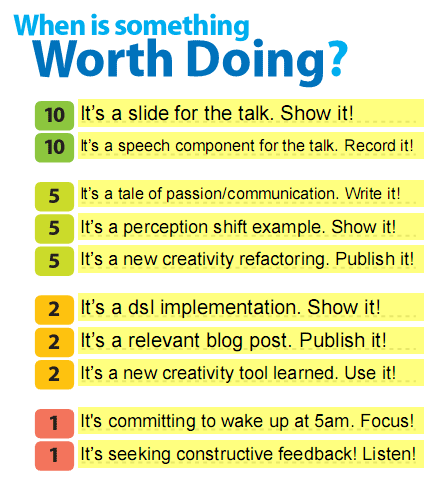Over the years I have used several productivity approaches, from goal-driven/top-down (e.g. Steven Covey’s First-Things-First quadrants) to more reactive/bottom-up (e.g. David Allen’s Getting Things Done).
I have also used more tactical approaches, such as the 48 minutes rule, which I always find surprisingly effective, particularly when I know I can work for some time uninterrupted.
To beat my worst procrastination habits however, I’m now using another set of productivity weapons: David Seah’s The Printable CEO tools.
In the last few months I started measuring where my time goes during my work day. It is always a good idea to know where you are, before taking corrective actions and get where you want to go, don’t you think? Armed with my trusted TimeLeft countdown, every fifteen minutes I tracked my activities (and distractions) in the Emergent Task Timer. After a while I got pretty used to it.
The form that really got my attention, however, is the Concrete Goals Tracker. David suggests a brilliant motivational approach which comes from his experience in the gaming industry: every time you complete something worth doing, you award yourself points.
In the last couple of years I’ve been doing quite a bit of research on motivational patterns emerged in game development and it is amazing to realize how simple things like adding a score to value our activities can trigger some of the most primitive mechanisms of our brain.
This morning, I thought I could use this system at home to help me focus on the tangible things I can do in preparation to my next talk.
Here is my first draft:

Don’t worry if you don’t quite understand some of the items I have written for now. It will all become clearer in the next few weeks. Let’s just say that these are relevant to my talk. The actual deliverables (slides and narrative) are worth 10 points, the goal supporting activities are worth 5 or 2 points, the attitude 1 point.
So what do you think? Would a system like this work for you? In my case, I have absolutely no doubts!

One thing I find helpful is to turn off “auto receive” for mail etc and close MSN. A problem yet to be solved when you manage a team is when they need your time. You can’t say “sorry, my 48minuter timer still has 27 minutes remaining”
Right back to work now 🙂
Eheh you are absolutely right! I actually use the 48 minutes timer mostly when I work from home on some focused project actually. Turning off auto receive, or have a longer pull schedule is another good advice (GTD says that too). Now, if we could be brave enough to schedule our internet access as well 😉
Pingback: Excellent “Getting Things Done” post at The Social Programmer
Hmmmm…
Did you just create a new billing model for consultancies? You know that I head up a consultancy and like all consultancies, we always charge by the hour, no matter how it is disguised 😉
We also ask our teams to track time spent on tasks, but that’s just for billing purposes. Now, there’s two paths here that I need to explore. (a) What if we charged by points? and (b) What if I started analysing points against hours billed?
I am definitely going to do this experiment over the next few weeks and will blog my results 🙂
Interesting thought Aslam. The points are mostly a form of reward for personal but concrete deliverables. I wonder if your twist is pure evil or a stroke of genius, by the way 🙂
In any case I’d love to hear the result of your experiment and what list of objectives you would suggest in your specific case.
In fact, I have a little idea to explore. It would be amazing if each team member volunteered to came up with such a list. A personal list (private, or otherwise reviewed/public) would help each and everyone to focus on what is their role and personal contribution to the organization. Am I a dreamer, or such dream teams can exist for real? Surprise me.
Enjoyed the article, ta. The increase in productivity on this blog is a good advertisement for the techniques outlined… 🙂 … long may it continue!
At the risk of being a procrastination-enabler, I recommend the following website for smart critiques of all types of worthwhile games, http://playthisthing.com/
I wrote an article in at least half the time that it would usually takes me with the 48 minute rule and an old fashioned cooking clock. Very helpful!
Excellent Paul. The simplest techniques and tools are often the most effective. The 48 rule is a form of time boxing, an “invention” that never stops to surprise me.
Pingback: Claudio Perrone’s Monologues » Blog Archive » Public speaking? Like a great movie!